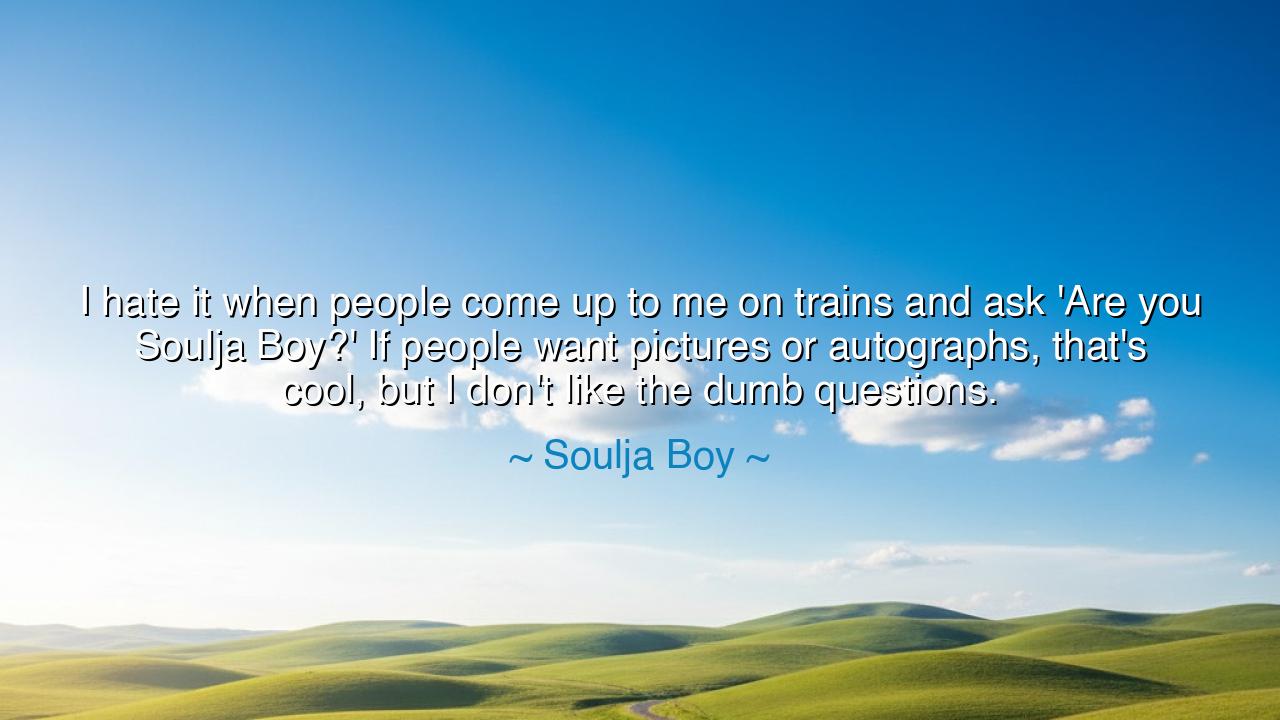
I hate it when people come up to me on trains and ask 'Are you
I hate it when people come up to me on trains and ask 'Are you Soulja Boy?' If people want pictures or autographs, that's cool, but I don't like the dumb questions.






"I hate it when people come up to me on trains and ask 'Are you Soulja Boy?' If people want pictures or autographs, that's cool, but I don't like the dumb questions." These words spoken by Soulja Boy illuminate a common struggle experienced by those who rise to fame. In his statement, he expresses a frustration that many can relate to, regardless of their social standing: the invasion of personal space and the burden of being reduced to a label or a persona. The question "Are you Soulja Boy?" is not merely an inquiry; it is a reminder that, for all his talent and success, he is often seen not as a person but as a public figure. In this, he speaks to the alienation that can arise from being seen through the lens of celebrity, and the disconnect between personal identity and public perception.
In the ancient world, figures of great renown often faced similar challenges. Consider Alexander the Great, whose name became synonymous with conquest and glory. As he marched across the world, he was often seen not as a man, but as a symbol of power. In the public eye, he was Alexander the Great, the conqueror, and not Alexander, the human being with desires, doubts, and personal struggles. His conquests were monumental, but the weight of his fame meant that he was forever removed from the privacy most individuals enjoyed. Alexander knew that in the eyes of his people, he would always be the great leader and never simply a man seeking solace. His frustration with being reduced to a figurehead speaks to a timeless truth about the cost of fame: it strips the individual of their humanity, leaving them vulnerable to the perceptions and expectations of others.
This tension between personal identity and public persona is something many have experienced. Socrates, too, though not famous in the way we understand celebrity today, grappled with the notion of being labeled. He famously declared that he was not a teacher, though many called him one, and yet his questions, his ideas, and his method of engaging others created a persona of profound intellectual significance. His frustration came not from being recognized, but from being misunderstood or reduced to something he did not fully represent. Soulja Boy, like Socrates, seeks to maintain control over how he is perceived. For him, it is not the act of being recognized that is troublesome, but the simplification of his identity into a single question that strips away the complexity of his being.
Soulja Boy’s frustration is rooted in the desire for authenticity—to be seen for who he is, beyond the fame. Much like the Greek heroes who sought recognition for their virtue, Soulja Boy is not simply seeking the attention that fame brings, but the respect and genuine connection that come with understanding who he truly is. The constant bombardment with questions reduces him to a character, and this diminishes the value of his work and his humanity. Respect, in this sense, is not just about admiration for accomplishments, but the deeper acknowledgment of a person’s fullness—their multifaceted nature that exists beyond the stereotypes attached to their name.
Throughout history, there have been countless figures who, much like Soulja Boy, felt the tension between their public identity and personal existence. One of the most poignant examples is Marilyn Monroe, whose image as a glamorous, beloved actress overshadowed the depth of her struggles as a woman striving for independence and self-respect. Though she was adored by millions, she felt trapped in the image created by others—a role she had to perform. Monroe and Soulja Boy share a similar frustration: the constant scrutiny and reduction of their humanity into something easily consumed and quickly discarded. Their stories remind us of the cost of fame—how it can alienate the individual from their authentic self.
The lesson we can take from Soulja Boy’s words is about self-definition. The public eye has a tendency to reduce people to simplified versions of themselves, whether it’s the celebrity or the scholar, the athlete or the artist. To allow others to define us by their own expectations is to lose sight of our true essence. We must strive to assert our own identity and not let ourselves be trapped by the labels others place upon us. Just as Socrates and Alexander had to maintain their individuality in the face of public expectation, so too must we navigate the world in a way that allows us to remain true to our inner self.
Let us, therefore, heed the wisdom of Soulja Boy and all those who have come before us: while recognition is inevitable in our lives, true fulfillment comes not from the world’s validation but from internal understanding. Let us seek to define ourselves, not by the questions others ask, but by the choices we make, the values we uphold, and the connections we nurture. The identity we cultivate is our most precious possession—one that cannot be reduced to a single question or a simple label. Let us embrace the complexity of our being and walk confidently in the path of our own truth.






AAdministratorAdministrator
Welcome, honored guests. Please leave a comment, we will respond soon